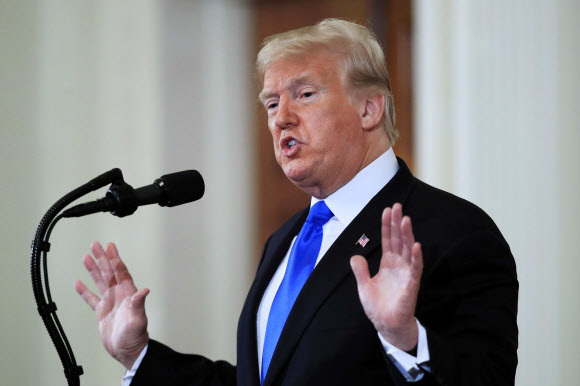 |
|
US President Donald Trump holds a White House press conference on Nov. 7, the day after the US midterm elections, saying he will hold his second summit with North Korean leader Kim Jong-un early next year.
|
US president appears poised to continue N. Korea dialogue after midterm elections
US President Donald Trump reaffirmed on Nov. 7 that he plans to have a second bilateral summit early next year with North Korean leader Kim Jong-un. He also announced plans to reschedule high-level North Korea-US talks that had been announced for Nov. 8 before being abruptly postponed a day beforehand. With the midterm elections no longer restricting his range of options as president, Trump appears to be reaffirming his commitment to keeping the momentum going in North Korea-US dialogue. When asked about the schedule for the second summit with Kim during a press conference at the White House the day after the midterm elections, Trump replied, “Sometime early next year.” “We’re going to change it [the meeting schedule] because of trips that are being made. We’re going to make it at another date,” he explained about the postponed high-level meeting in New York. “That meeting is going to be rescheduled,” he said later. Trump also repeatedly stressed that the US was “in no rush” in its negotiations with Pyongyang and that “the sanctions are on.” “Now, I’d love to take the sanctions off. But they [North Korea] have to be responsive, too. It’s a two-way street,” he said in a message calling on Pyongyang to take action. Indeed, Trump repeated the words “the sanctions are on” four times and “no rush” seven times, in what could be read as a kind of pressure campaign against North Korea. Postponement of high-level talks confirmed to have been requested by Pyongyang The postponement of the high-level talks was also confirmed to have been requested by Pyongyang. During a plenary session of the National Assembly Foreign Affairs and Unification Committee on Nov. 8, Minister of Foreign Affairs Kang Kyung-wha said Washington had “explained to us that it had received a notification from the North asking for the postponement.” “The US told us that there has been an explanation from the North that they wanted a postponement because their mutual schedules were so busy,” Kang explained. North Korea reportedly pushed strongly for a meeting between Workers’ Party of Korea Vice Chairman Kim Yong-chol and Trump to resolve the sanctions issue, eventually postponing the talks after no date could be set for the meeting due to Trump’s planned visit to Europe on Nov. 9. Analysts also interpreted the postponement as Pyongyang sending the message that the North Koreans are “not pushovers.” The question of when the high-level North Korea-US talks are rescheduled now looks set to be a major signal for the negotiations’ prospects. Administration officials and experts predicted the talks would be resumed within the year. “President Trump said they’d be holding a North Korea-US summit early next year, and the North Korea-US summit is one of the agenda items at the high-level talks,” noted a senior South Korean government official familiar with the situation in North Korea-US relations, who concluded that the likelihood of the talks happening within 2019 is strong. “The fact that the US said that much should be taken as meaning there has been some considerable progress in behind-the-scenes dialogue with North Korea,” the official added. But with a large gap to bridge between North Korea’s demands for immediate loosening of sanctions and the US’ insistence on denuclearization before sanctions are lifted – along with growing internal frustration in North Korea over sanctions impeding progress in economic development – some observers worry the momentum could end up drained if the talks keep getting postponed over the two sides’ failure to meet in the middle. Others have suggested the possibility of reaching a compromise is being undercut by the US’ failure to state a clear standard for the kind of denuclearization progress needed from North Korea before it will loosen sanctions. Delays in North Korea-US talks also restrict progress in inter-Korean relations Delays in the high-level North Korea-US talks also affect the implementation of agreements between South and North Korea. Matters such as a joint survey of the Gyeongui (Seoul-Sinuiju) railway line and full-scale repairs and renovation of the reunion site for divided families are tied to the sanctions currently imposed on North Korea. Administration officials have said that while the sanctions have some effect, the situation does not bar them from implementing the terms of the inter-Korean agreements. But with the US insisting that inter-Korean relations should not “get ahead of things” before North Korea and the US agree on a concrete denuclearization process through their high-level talks, some are suggesting it will become more difficult to implement the inter-Korean agreements. “Inter-Korean cooperation is definitely constrained when the US isn’t cooperating,” said Professor Kim Joon-hyung of Handong Global University. “It’s a difficult situation where we ultimately have to decide how the government is going to achieve progress, and whether South Korea can play a leading role through things like a reciprocal visit by Kim Jong-un,” he added. By Noh Ji-won, staff reporter, and Hwang Joon-bum, Washington correspondent Please direct comments or questions to [english@hani.co.kr]






